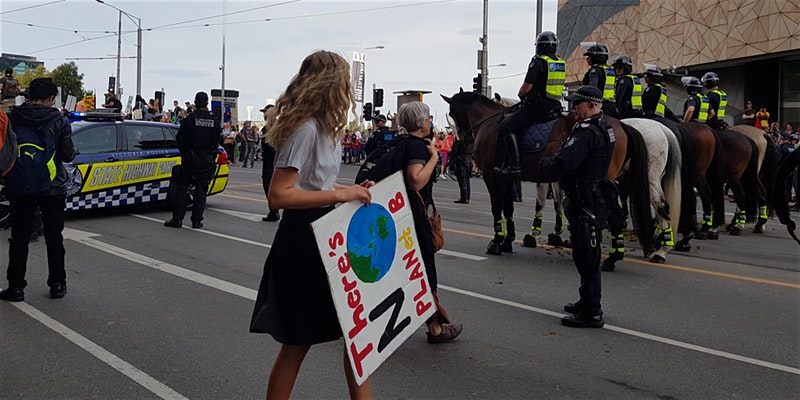How quickly can we achieve climate justice? Does climate justice mean we need to be careful and considered and/or hurry up? In what ways does declaring and responding to the 'climate emergency' contribute to climate justice, or potentially undermine it? What steps need to be taken to ensure that declaring a climate emergency doesn’t lead to ‘states of emergency’ and authoritarianism?
Recent events in Australia highlight the need to consider the pros and cons of declaring a ‘climate emergency’. Efforts to outlaw climate protests demonstrate that some groups are threatened less by climate change than protests about it. Yet ‘climate emergency’ was the Oxford English Dictionary’s 2019 Word of the Year, demonstrating the reach and power of this phrase to capture the world’s imagination and inspire urgent climate action.
Join leading climate change researchers and practitioners as we tackle the pressing questions that the ‘climate emergency’ raises.
Panelists
(Recently added) Dr Briony Towers, Centre for Urban Research, School of Global, Social and Urban Studies (GUSS), RMIT University
Briony has been conducting disaster risk reduction research with children and young people for over ten years. Her PhD in socio-cultural psychology at the University of Tasmania involved an in-depth investigation of children's knowledge of vulnerability and resilience to wildfire risk in south eastern Australia. She is currently the lead investigator on the Bushfire and Natural Hazards CRC project 'Building Best Practice in Child-Centred Disaster Risk Reduction'. She is also a member of the National Disaster Resilience Strategy group and a research advisor on the European Commission’s CUIDAR project. Briony’s primary research interests concern the root causes of disasters and how these can be addressed through place-based critical pedagogies and children's genuine participation in disaster management policy, research and practice. She is also interested in intergenerational climate justice and student-led climate activism.
Associate Professor Lauren Rickards, School of Global, Urban and Social Studies (GUSS), RMIT University.
A Lead Author with the Intergovernmental Panel on Climate Change’s forthcoming Sixth Assessment Report on Impacts, Vulnerability and Adaptation, Lauren co-leads the Climate Change Transformations research program at the Centre for Urban Research and teaches on climate change into undergraduate and postgraduate courses in the Sustainability and Urban Planning area of GUSS. Among other realms of climate in/justice, Lauren’s research has investigated climate change’s ‘slow emergencies’ such as drought, as well as the logics through which societies ignore, normalise, deny or tolerate the harms climate change inflicts on marginalised people and the non-human world.
Dr Bronwyn Lay, Ecological Justice Coordinator for Jesuit Social Services and Coordinator of the Climate Change Exchange at RMIT University.
Bronwyn has engaged with the intersection of grassroots communities and ecological justice for the past 13 years.
With a background in criminal and family law she completed her PhD on land governance and ecology at the European Graduate School in 2014 with a focus on ecocide law. While living in France she worked as a legal consultant for international NGO’s and expert organisations on environmental crime at the Hague and United Nations and was the Director of the International Caux Dialogue on Land and Security. She has published in a wide variety of forums on the subject of ecological justice, including her book Juris Materiarum: Empires of Earth, Soil and Dirt.
Dr Mittul Vahanvati, Lecturer at RMIT University in the Sustainability and Urban Planning Discipline.
Mittul completed her PhD research in 2018, investigating the long-term impacts of post-disaster housing reconstruction projects in terms of building community resilience. She entered academia after 10 years of practice in architecture industry in Australia, Switzerland and India. She is co-founder of a Melbourne-based design + build studio Giant Grass (GG) and coordinator of RMIT’s Urban Futures Early Career Researchers’ Network. She is currently the lead researcher working with rural communities in Victoria to co-produce their climate resilience action plan. She is also part of a team of researchers involved in a large-scale action-research project in the Solomon Islands, 'Climate Resilient Honiara', funded by the UNFCCC Adaptation Fund and administered by UN-Habitat. Her teaching, practice and research lies in co-creation of knowledge around issues of housing, ecologically sustainable built environment, urban design, disaster recovery and community resilience.
David Mieklejohn, Executive Officer of the Northern Alliance for Greenhouse Action (NAGA) and PhD Candidate in RMIT’s Centre for Urban Research.
David currently works as the Executive Officer for the Northern Alliance for Greenhouse Action (NAGA), a network of nine Melbourne metropolitan councils working together on climate change projects. In this role, David coordinates climate action among a broad range of Victorian actors. David’s research as a PhD student investigates how local councils in Australia are implementing behaviour change programs to respond to climate change, as well as how their declarations of a climate emergency are changing their governance practices.
Moderator
Dr Blanche Verlie, Postdoctoral Research Fellow, Sydney Environment Institute, the University of Sydney.
Blanche has been teaching climate change mitigation and adaptation at RMIT University in the Sustainability and Urban Planning Discipline since 2015, and completed her PhD in climate change education at Monash University in 2019. Her research investigates people’s emotional responses to learning about climate change, and how this affects their identity and relationships, including how this is an issue of intergenerational in/justice, which you can read about here: https://theconversation.com/the-terror-of-climate-change-is-transforming-young-peoples-identity-113355. Blanche has recently moved to the University of Sydney to continue her research, and is working on the Multispecies Justice research program there.
This event is part of the 2020 National Sustainable Living Festival.
We acknowledge this event is taking place on stolen and unceded Wurundjeri Country. This event is free but we encourage you to donate to Seed Youth Indigenous Climate Network https://www.seedmob.org.au/donate

